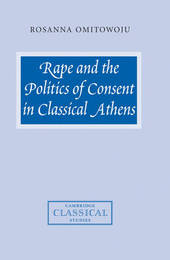
|
Rape and the Politics of Consent in Classical Athens
Paperback / softback
Main Details
| Title |
Rape and the Politics of Consent in Classical Athens
|
| Authors and Contributors |
By (author) Rosanna Omitowoju
|
| Series | Cambridge Classical Studies |
|---|
| Physical Properties |
| Format:Paperback / softback | | Pages:264 | | Dimensions(mm): Height 216,Width 140 |
|
| Category/Genre | World history - BCE to c 500 CE |
|---|
| ISBN/Barcode |
9780521100267
|
| Classifications | Dewey:306.709385 |
|---|
| Audience | | Professional & Vocational | |
|---|
| Illustrations |
Worked examples or Exercises
|
|
Publishing Details |
| Publisher |
Cambridge University Press
|
| Imprint |
Cambridge University Press
|
| Publication Date |
18 January 2009 |
| Publication Country |
United Kingdom
|
Description
This book is an in-depth study of the topic of rape in classical Athens. Its central focus is on violent sexual encounters but it also raises questions about the nature and ingredients of any type of sexual activity in Athens. In particular it concentrates on two related areas: the law of classical Athens, especially as represented by speeches delivered in court, and the plays of Menander. These work at complementary levels in respect of period, subject matter and concerns with social conformity, while at the same time being widely different genres of discourse. It is argued that within the evaluation of heterosexual activity in Athens considerations about the consent of the female party were never the key factor. Rather it was the status of the two parties, in social, marital and political terms which ultimately determined whether or not a sexual act was regarded as acceptable.
Author Biography
Rosanna Omitowoju held a Research Fellowship at King's College, Cambridge after completing her doctoral thesis. She is now a Fellow of King's College and holds a teaching position within the Faculty of Classics.
Reviews"Omitowoju's treatment of the material does reveal how it might serve as a frame for understanding ancient attitudes toward the sexual assault of women. More profoundly, it exposes the fact that because female victims of sexual assault in antiquity had no legal recourse except through the agency of guardians, the subject of rape cannot even be broached without considering how it impinges on male citizen status." American Journal of Philology "[This] book, for both content and methodology, will be of interest to historians, and anyone else concerned with issues of law, sexuality, gender, and civic identity." Phoenix
|